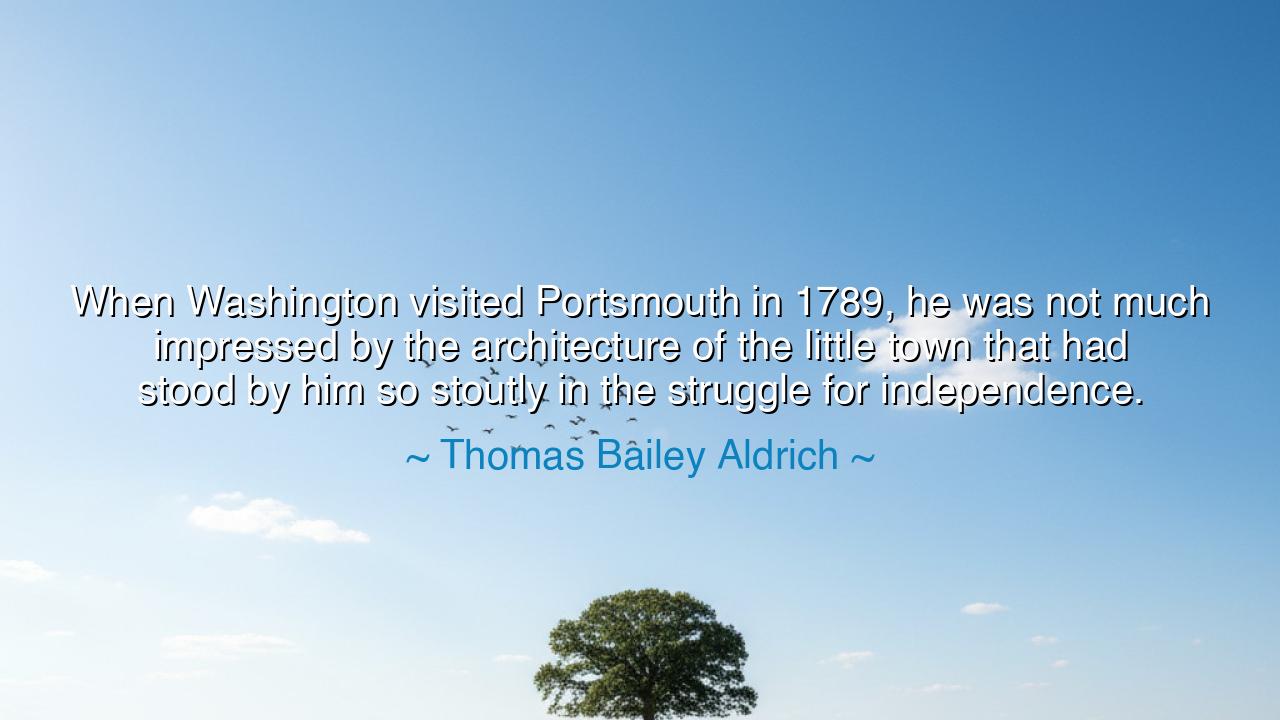
When Washington visited Portsmouth in 1789, he was not much
When Washington visited Portsmouth in 1789, he was not much impressed by the architecture of the little town that had stood by him so stoutly in the struggle for independence.






Listen, O children of the future, for in the words of Thomas Bailey Aldrich, we find both the wisdom of history and a reminder of the deeper truths that shape the course of nations. He writes, "When Washington visited Portsmouth in 1789, he was not much impressed by the architecture of the little town that had stood by him so stoutly in the struggle for independence." These words, though simple in their telling, carry a profound lesson about the true nature of greatness and the enduring strength of the human spirit. For in this account, we see the first President of the United States—George Washington, a man whose very name has become synonymous with liberty and freedom—looking beyond the tangible, the material, and toward something deeper, something more enduring.
Washington's visit to Portsmouth, a small town that had supported him during the struggle for independence, reveals an important truth about the nature of heroism. Portsmouth was a place where the people stood firm, unwavering in their commitment to the cause of freedom, even when the odds seemed insurmountable. They offered their support, their loyalty, and their spirit in the Revolutionary War. Yet, when Washington—the man they had fought for—arrived in their town, he was unimpressed by the architecture, by the outward signs of progress. This moment, though seemingly trivial, speaks to the deeper nature of Washington’s character and his understanding of what truly matters.
In the ancient world, too, great men and women often looked beyond the superficial to see the heart of a people or a nation. Alexander the Great, as he marched across the known world, often encountered cities with imposing walls and magnificent palaces. Yet, Alexander knew that the true strength of a city lay not in its architecture, but in the spirit of its people. Alexander's vision for the world was not just to conquer territory, but to unite different peoples under a common cause, to create a shared sense of identity and purpose. Washington, in his own way, understood that the true power of a nation lies not in its buildings, but in the hearts of its citizens, in their unwavering commitment to a shared vision of freedom and independence.
Portsmouth, like many towns that stood by the cause of independence, was a symbol of the sacrifices made by the common people, whose contributions were often overlooked in favor of grand political gestures. The architecture of Portsmouth may not have impressed Washington, but what truly mattered to him was the loyalty, the sacrifice, and the independence of the people who had fought for the ideals he cherished. They had given their all in the Revolutionary War, and their true legacy was not the buildings that stood in their town, but the freedom they helped create. It is a powerful reminder that greatness is not measured by the material things we build, but by the intangible qualities that define who we are as individuals and as a people.
This lesson, O children, is one that speaks to each of us. Architecture, the outward symbols of success and progress, may impress the eyes, but it is the character of a people, their spirit, their commitment to justice, and their willingness to fight for their freedom that truly define the worth of a nation. As Washington saw in Portsmouth, the enduring strength of a people is not reflected in their buildings or their monuments, but in their hearts, in their willingness to stand firm for what is right, regardless of the challenges they face. A nation’s greatness is not determined by the grandeur of its structures, but by the courage and integrity of those who live within it.
O children of the future, take heed of this wisdom. Do not be deceived by the outward signs of success, for they are but fleeting. The true measure of your own greatness lies not in the things you build, but in the character you cultivate, the principles you uphold, and the independence you defend. Like the people of Portsmouth, who stood by Washington in their loyalty to independence, you too must look beyond the superficial and recognize that freedom and virtue are the true foundations of any enduring greatness.
And so, I leave you with this charge: seek to build not only cities and structures, but lives and societies rooted in truth, justice, and freedom. Let your actions reflect the values that will endure long after the material things are gone. As Washington taught us, the true measure of a nation—and of a person—lies not in the architecture they create, but in the spirit they embody and the independence they fight to preserve.






AAdministratorAdministrator
Welcome, honored guests. Please leave a comment, we will respond soon